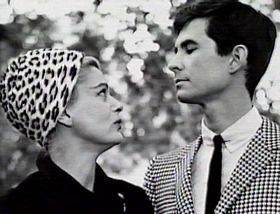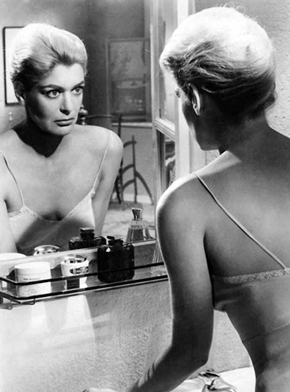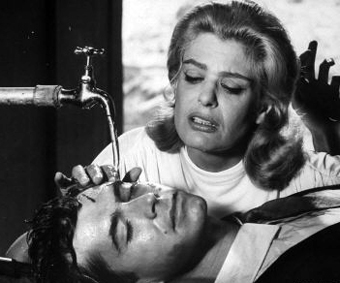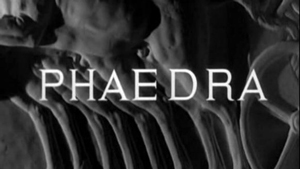
 |
|
|
|
Expatriate American director Jules Dassin and Greek beauty Melina Mercouri made quite a power couple in European filmmaking. Their third film together Never on Sunday was a monster international hit, even in America where it burst the cultural barrier against movies specifically about prostitution. Ms. Mercouri was already in her forties but communicated a passionate intensity on-screen that made her impossible to ignore. Like a Lizabeth Scott with exaggerated facial features and an even more gravely voice, she was unlike any other actress. 
Rather than do a lame sequel to Sunday, Dassin and Mercouri went full-on Greek with their next film, the relatively lavish Phaedra. Writer Margarita Lymberaki helped Dassin transpose a play by Euripides to the jet set of the 20th century. Instead of mythological figures the main players are a vastly wealthy Greek shipping magnate, his aggressive and competitive sons and their spouses. Powerful Thanos (Raf Vallone) is too busy with his international deals to spend time with his impulsive, elemental wife Phaedra (Mercouri). He instead sends her to London, to convince his son by an earlier marriage, Alexis (Anthony Perkins), to give up his 'foolish' interest in painting and return to learn the shipping business. Phaedra is a Greek tragedy all the way. The original myth involves Phaedra's husband Theseus, his previous wife Hyppolyta and her son Hyppolytus. It involves rejected women, angry gods, dynasty-destroying infidelities, false charges of rape and a vengeance aided by magic given Theseus by Poseidon. In one version Hyppolytus ends up dragged to his death when his horses are frightened by Poseidon's sea monster. In Dassin and Lymberaki's version Phaedra gains Alexis's attention by promising that Thanos will buy him the sports car of his dreams if he abandons his paints and returns to the family compound on the island of Hydra. But she has also acknowledged her sexual interest in Alexis through a typically irrational, impulsive act -- throwing a priceless ring, just given to her by Thanos, into the Thames. It's more than obvious that Phaedra is openly tempting disaster. 
Stepmother and stepson rendezvous with Thanos in Paris but he takes off on another business trip. This leaves Phaedra and Alexis to their own devices in Paris and we can guess what will happen. Back on Hydra, Alexis receives his dream car, while Thanos tries to set him up to marry his brother's daughter (hopefully not a blood cousin), Ercy (Elisabeth Ercy). The teenaged girl becomes furious when Alexis plays the field at a party, apparently sleeping with a pickup on a boat. But that's nothing compared to the fury unleashed when Phaedra sees Alexis with another woman. Now acting on pure instinct, Phaedra refuses to let their affair end and risks everything by kissing her stepson in the family compound. Only Phaedra's maid, who has predicted this calamity, witnesses the kiss. Phaedra chooses the worst possible time to approach Thanos with the truth of what is going on -- a giant merchant ship built as her namesake has sunk off Norway, taking many local sailors down with it. Phaedra was reportedly a European hit but did little business in America, where Anthony Perkins's association with Psycho frustrated his attempts to establish himself as a leading man. The movie also lacks the comedy of Never on Sunday; the only humor to be found is when Perkins' Alexis hams up his erotic auto showroom encounter with his "new love", an Aston Martin sports coupe soon to be immortalized in Goldfinger. Even then, Mercouri's unrestrained laughter is almost grotesque -- she's a force of nature incapable of moderated reactions. Mercouri's Phaedra is a wholly believable out-of-control female. Thanos has no appreciation of his wife's volcanic capacity for emotional destruction. If she can throw away a fabulous stone on a whim, there's no limit to what she'll do. Her actions put both herself and Alexis on the road to oblivion. Depending on one's individual taste, the big sex scene is either overdone or gloriously hyperbolic. Dassin shoots Alexis' and Phaedra's lovemaking in the shuttered Paris apartment in an elaborate series of soft-focus images. Filming through windowpanes flowing with rainwater in the direction of a blazing fireplace suspends the lovers literally between fire and water. Although Mercouri and Perkins don't generate a powerful sexual charge together, Mercouri's intensity fills the gap. And with Mikis Theodorakis' rhapsodic theme music blasting away, Dassin could have filmed two stick people tangled together and achieved the right tone of 'classic doomed love'. In fact, Theodorakis' music score is probably Phaedra's strongest asset -- the film is a case of images and music working beautifully together, despite a secondary musical theme that's less than compelling. 
Mercouri looks great -- if extreme -- in her very special brand of sexual attraction. Raf Vallone is consistently energetic and hearty pursuing his shipping empire; his wife unfortunately comes low on the list of his immediate concerns, something Phaedra won't abide. Anthony Perkins is excellent as the budding artist trying to avoid the life proscribed for him. The film was made when Perkins was hoping to establish himself as a romantic star, paired with Mercouri, Ingrid Bergman (Goodbye Again) and Sophia Loren (Five Miles to Midnight). Only once does a "Norman Bates" gesture pop up, when Perkins raises a hand, palm outstretched, to make a point. Mercouri was a serious politician in some of the most tumultuous years in Greece. She championed national pride and culture. One of her great ambitions, never fulfilled, was the return to Greece of the fabled Elgin Marbles. In the first decade of the 1800s a British Ambassador to the Ottoman Empire found a way to appropriate (loot?) a large quantity of marble sculptures that originally were part of the Parthenon. In the movie Phaedra first finds Alexis sketching the 247-foot marble artwork in a long hall in the British Museum. The filming location was obviously chosen to make a point; it also looks as if sections of the ancient artwork provide a background for the film's main titles (image below). 
The MGM Limited Edition Collection DVD of Phaedra is a very good enhanced transfer of this B&W romantic tragedy. The streets of London and Paris and the sun-swept island of Hydra are well represented, as is Alexis's frantic driving in his gunmetal-gray Aston-Martin, his face shredded from a beating by his father. The Mikis Theodorakis score, which tended toward distortion on older 16mm prints, is much stronger here. MGM has included an original trailer that tries its best to make Phaedra look like a must-see movie. I have a nagging feeling that U.S. audiences, besides not feeling comfortable with Perkins, thought Mercouri too severe, and the title too artsy and obscure. Not that "Never on Sunday with Your Stepson" would have been an improvement.
On a scale of Excellent, Good, Fair, and Poor,
Phaedra rates:
Reviews on the Savant main site have additional credits information and are often updated and annotated with reader input and graphics. Also, don't forget the 2010 Savant Wish List. T'was Ever Thus.
Review Staff | About DVD Talk | Newsletter Subscribe | Join DVD Talk Forum |
| ||||||||||||||||||